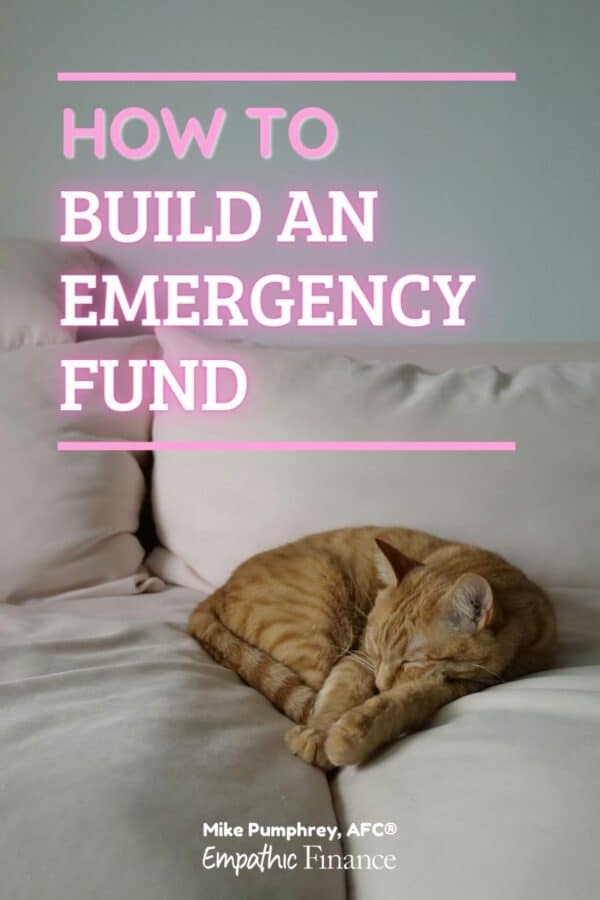Deciding to build an emergency fund is one of the most important and anxiety-reducing steps you can take with your money.
Let’s face it; the world is a scary place right now. We have—to use a technical term—incompetent idiots running things, trying their hardest to break the world order and hurt as many people as possible in the process, it seems. That’s enough to make anyone feel afraid.
Fear is a strong emotion, and it can cause people to behave in less reasoned, less-productive, less-intelligent ways.
But fear can also be a great motivator, pushing us to do things we wouldn’t otherwise do.
And so, if you’re afraid of what’s going on in the world right now, there’s one way that you can enact a really positive outcome for yourself: you can build an emergency fund.
But what is an emergency fund? And how do you build it?
Glad you asked.
Table of Contents
What is an emergency fund?
An emergency fund is an amount of money set aside specifically for emergencies.
The distinction here is that the emergency fund money should be separate and liquid:
- Separate, meaning that the funds are not commingled with other money sources (so not in your checking account)
- Liquid, meaning that you can access the money relatively quickly and without penalty (so not in your 401(k))
This money can be in a savings account or money market account, or less-likely but potentially cash in a jar. And it should be reserved exclusively for emergencies. So not for a big sale, or a trip you want to take. (Here’s how to know if something is really an emergency.)
How much do I need in my emergency fund?
I’m actually going to update this from what I’ve said in the past.
In the past, I’ve said that you need 3-6 months of expenses, meaning that if your income went to zero, you have enough to cover your needs for 3-6 months. But with the state of the world being so uncertain, and layoffs so widespread, I actually don’t think that is sufficient.
So I’m going to say that optimally, you should have 12 months of expenses saved in an emergency fund. Yes, a whole year.
Note that I’m not saying you need an amount equal to 12 months of income. After all, your expenses are probably a little less than your income, right? (Do you put away anything in savings? Pay extra on debts? You wouldn’t keep doing that in an emergency.)
No really, how much do I need in my emergency fund?
I can’t tell you how much money is 12 months of expenses for you. You would need to figure that out for yourself.
I recommend tracking your spending to find out. Do it for an entire month and see what you come up with. Then multiply by 12.
If you are living paycheck-to-paycheck with no wiggle room, then you’d want an amount equal to your monthly take-home pay times 12. If you’re able to be flexible and put some money away each month, then maybe you pick a number that’s 50-80% of that.
As an example, if you made $50,000 a year, your take home pay may be somewhere around $3,000 a month. So I would save between $18,000 and $28,000, all the way up to $36,000 if you’re really strapped.
Yes, I know that’s a lot. But what’s your alternative if you’re out of a job for a long period of time? A credit card? Emergencies are the worst time to take on debt.
How to fill up an emergency fund
If you’re serious about filling up your emergency fund, and I hope you are, you’re going to need to get focused.
First, if you can reduce your discretionary spending, do it, and funnel the difference into your emergency fund. I recommend “paying yourself first” at the beginning of the month to force yourself to make it happen.
Are you paying extra on anything, like student loans or your mortgage? If so, pause on that, and funnel that extra money into your emergency fund. (Maybe not credit card balances, as they can be very high-interest rate.)
Can you take a look at savings you have for other purposes, and dedicate some or all of those funds for your emergency fund? What if you were to cut your travel fund in half? Remember that you can always build it up later.
Can you sell something of value? I bet you probably could.
The big takeaway here is that if you can’t make any large steps, then make a lot of small ones. Set up an automatic transfer of whatever amount you can to your emergency fund each month. Set it and forget it. You’ll be amazed at how quickly the money piles up.
Do this now
An emergency fund is important. Vital, even. When you lose income, or just need more in a pinch, an emergency fund is what’s standing between you and big problems.
And when you have income, your emergency fund acts as an anxiety reducer. I believe that the emergency fund is the single most powerful emotional regulator in all of personal finance. You will feel better just by having it. The more you have, the better you’ll feel.



